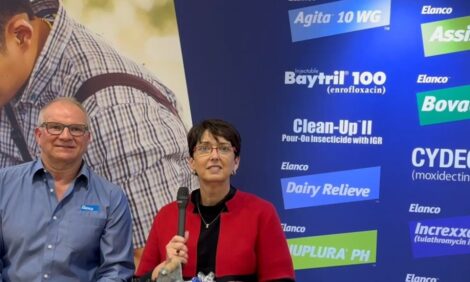



Montana veterinarian encourages a fresh look at deworming protocols
Is it time to take review your herd’s deworming program to identify areas of improvement?“We’ve always done it this way” is known to be the most dangerous phrase in business, and the cattle business is no exception, says Dr. Perrie Neal of Hardin, Montana. With more than a decade of experience working with cow-calf producers, she says it never hurts to take a fresh look at your herd’s deworming program to identify potential areas of improvement.
Dr. Neal manages her own herd of registered and commercial Angus alongside her husband and father-in-law. When possible, she likes to test out products and practices on their own cattle before she makes recommendations to her customers.
“It’s great to have that firsthand experience,” she says.
Over the last few years, Dr. Neal has worked to optimize the timing of her deworming program — and now she tries to deworm calves as early as possible each season for maximum benefit.
“Weaning weights are really important, especially in our registered cows,” she says. “By administering a dewormer early in the season, you can help ensure calves won’t have to carry a heavy parasite load and are more likely to meet their genetic potential.”
Dr. Neal also has looked closely at the dewormer route of administration and product efficacy — and encourages her customers to do the same.
“Convenience is a big factor when it comes to deworming programs, so a lot of my customers have historically used pour-ons for that reason,” she explains. “But a lot of times, the injectable dewormers can improve labor efficiencies and help ensure more accurate dosing.”1
That’s one of the reasons Dr. Neal has come to appreciate Valcor® (doramectin and levamisole injection), a dual-action, single-dose, injectable dewormer.
“With Valcor, we weighed calves as they came in the chute, and my husband would yell out the number as they got on the scale,” she says. “I was able to quickly adjust the dosage depending on the weight of the calf. I love that about the product.”
Now, Valcor is a staple product in Dr. Neal’s calf preconditioning program.
“Preconditioning calves is another thing that I’ve been highly recommending to producers in the last few years,” Dr. Neal says.
Preconditioning programs promote calf growth, enhance immune function and minimize stress as calves move from their ranch of origin to the stocker or backgrounder operation and then to the feedlot.
“Preconditioning can help set calves up for their next production phase, but it also benefits any calves that producers want to retain as replacements,” Dr. Neal explains. “We used to just precondition the bulls and the replacement heifers, but over the last few years we’ve switched to preconditioning everything, and we’ve seen a lot less sickness across the board.”
If you’re thinking about taking a fresh look at herd health or deworming protocols, be sure to consult your herd veterinarian and local Zoetis representative. These local experts can help you identify products and practices that make sense for your operation. For more information on the parasite portfolio from Zoetis, visit GetLessParasites.com.



